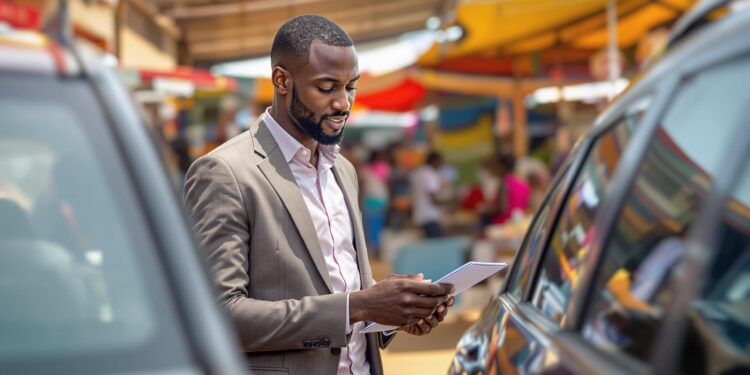Buying a car in Uganda can be risky if you’re not careful. Scammers are targeting buyers with fake ads, rushed payments, and counterfeit documents. Here’s how to protect yourself:
- Watch for red flags: Unrealistically low prices, Western Union payment requests, and sellers avoiding face-to-face meetings are common scam tactics.
- Verify everything: Check the seller’s ID, original vehicle documents, and URA (Uganda Revenue Authority) clearance.
- Inspect the car: Hire a professional mechanic to review the vehicle’s condition and verify the odometer reading.
- Stay safe during transactions: Meet in public, busy locations during the day, and use secure payment methods like bank transfers.
Use these steps to avoid scams and ensure a safe car-buying experience in Uganda.
Don’t buy a Car in Uganda before you know this
Top Car Scams in Uganda
Stay alert to these common scams to protect yourself when buying a car:
Fake Online Listings and Sellers
Scammers often lure buyers with luxury cars listed at unrealistically low prices. They use generic email addresses, make up elaborate excuses to avoid in-person meetings, and even create fake escrow services like "Bob Shop." Messages are often rushed and filled with grammar mistakes, creating a sense of urgency.
Odometer Tampering and Hidden Issues
Odometer rollback is a common trick. Compare the mileage to the car’s age – typical annual use is about 15,000 km. Warning signs include marks around the dashboard, wear on seats or tires that doesn’t match the mileage, and malfunctioning gauges. Also, look out for dashboard tampering, inconsistent wear patterns, or warning lights that don’t work properly.
High-Pressure Sales and Payment Scams
Fraudsters may rush you by claiming there are other buyers or that the deal is time-sensitive. Be cautious of demands for untraceable payments like Western Union or fake escrow services. Avoid third-party escrow schemes altogether and stick to secure, verifiable payment methods.
Checking Seller and Car Details
Once you’ve noticed potential warning signs in an ad, the next step is digging into the seller’s credentials and the car’s history.
Make sure to verify both the seller’s identity and the vehicle’s documents. Here’s what to look for:
- A government-issued ID or passport that matches the name on the logbook
- The original vehicle registration book with matching chassis and engine numbers
- A URA clearance certificate proving that import duties have been paid
- A valid insurance policy or cover note for use in Uganda
- Maintenance records with consistent mileage to ensure proper upkeep
Required Seller Documents
Finding Reliable Car Info
URA Ownership Check
Car Inspection Steps
Once you’ve confirmed the seller’s identity and completed URA checks, it’s time to arrange a professional inspection. This step ensures the vehicle’s condition aligns with the seller’s claims. With credentials verified, shift your attention to a thorough vehicle evaluation.
Key Areas for a Mechanic’s Review
For cars over 3 years old, pay special attention to these components:
- Safety and driving systems: Seatbelts, dashboard warning lights, brakes, steering, and suspension.
- Lights and signals: Headlights, turn signals, hazard lights, and taillights.
- Other essentials: Defrosters, mirrors, windshield wipers, tire tread, and wear patterns.
Documents and Identification Numbers to Verify
Make sure these documents are in order and match the vehicle:
- Certification of Registration (RC): Confirm that the Vehicle Identification Number (VIN) and owner details are consistent.
- Insurance papers: Check the coverage dates to ensure the policy is active.
- No-Objection Certificate (NOC): Verify there are no outstanding loans or liens on the car.
- Original bill of sale: Confirm the seller’s signature and sale details are accurate.
Cross-check the VIN on all documents with the number stamped on the car’s chassis. A professional inspector can also help review records, including previous sales history, registration changes, accident reports, maintenance logs, and any manufacturer recalls.
Additionally, compare the odometer reading with service records to detect any signs of tampering. Be cautious of vehicles with salvage or rebuilt titles, as these often indicate significant prior damage.
Once the inspection and paperwork are complete, you can move forward with payment and finalize the transaction safely.
sbb-itb-7bab64a
Safe Buying Process
Once you’ve inspected the vehicle and verified the documents, it’s time to make the payment and meet the seller. Here’s how to do it safely.
Payment Safety Tips
- Stick to bank or mobile money transfers instead of carrying large amounts of cash.
- Double-check that the seller’s bank account name matches the name on the logbook.
- Always get and keep payment receipts before completing the ownership transfer.
Meeting the Seller Safely
- Schedule meetings between 9 AM and 6 PM in busy, public locations like shopping centers or police stations.
- Bring someone along for added security and as a witness.
- Let family or friends know your meeting location, planned route, and expected return time.
- Decide on a test drive route that avoids secluded areas.
- Collect the seller’s full name, address, phone number, driver’s license, and insurance details.
- For test drives, hold onto the seller’s keys or ID until the vehicle is returned.
Safe vs. Risky Deals
Once you’ve checked the documents and inspected the vehicle, it’s time to evaluate the offer. Use this checklist to separate trustworthy car deals from suspicious ones in Uganda. Look for clear paperwork, honest communication, and pricing that aligns with the market. Sellers who are upfront and provide proper documentation are more likely to be trustworthy, while evasive behavior and prices that seem too good to be true often signal trouble.
Signs of a Safe Deal
- Verified contact details: The seller has a legitimate business address and contact information.
- Fair pricing: The asking price aligns with the current market value.
- Original documents: All paperwork is complete and original.
- URA verification: The seller is open to ownership verification through the Uganda Revenue Authority (URA).
- Inspection-friendly: They allow a professional mechanic to inspect the vehicle.
- Secure payments: Accepts bank transfers or other secure payment methods.
- Vehicle history: Provides clear records of the vehicle’s history.
- Safe meeting location: Agrees to meet in well-lit, public spaces.
Warning Signs of a Risky Deal
- Avoids meeting in person: Communicates only through text or refuses face-to-face interactions.
- Suspiciously low price: Offers a price far below market value without a valid reason.
- Incomplete or fake documents: Provides missing, photocopied, or questionable paperwork.
- Excuses on URA checks: Refuses or delays ownership verification with URA.
- Pushes for quick decisions: Pressures you to buy without a proper inspection.
- Unusual payment requests: Asks for large deposits or non-traditional payment methods.
- No vehicle history: Fails to provide any records about the car’s past.
- Unsafe meeting spots: Suggests meeting in remote or isolated areas.
Conclusion: Smart Car Buying in Uganda
The Deal Safety Checklist and proper inspection steps are your best defense against scams. Legitimate sellers are open to document verification and mechanic inspections – be cautious of rushed deals or suspiciously low prices.
Here are key steps to ensure a secure purchase:
- Verify the seller’s identity and confirm URA clearance.
- Get a thorough mechanical inspection to check for hidden issues.
- Use secure payment methods, like bank or mobile transfers, and meet in public places.
- Compare prices with market data to avoid overpaying or falling for scams.
Stick to these steps to make your purchase confidently. For more tips and detailed guides on car buying in Uganda, check out AutoMag.ug.
FAQs
What steps should I take if I suspect a car-buying scam in Uganda?
If you believe you’ve come across a scam while trying to buy a car in Uganda, take immediate action to protect yourself. First, report the incident to the Financial Intelligence Authority (FIA) or visit your nearest police station to file a report. Provide as much detail as possible about the seller, the vehicle, and any suspicious interactions.
Additionally, avoid making any further payments or sharing personal information with the suspected scammer. Stay vigilant and use trusted platforms or dealerships to ensure safe transactions in the future.
How can I verify that a car’s documents are authentic and not fake?
To confirm the authenticity of a car’s documents, start by carefully inspecting the title for key security features such as watermarks, raised seals, and a unique vehicle identification number (VIN). Ensure the title includes a unique title number and that the seller’s name matches the one listed on the document.
Cross-check the vehicle details, like the VIN and make/model, to ensure they align with the information on the title. If you’re unsure, contact your local Department of Motor Vehicles (DMV) to verify the title’s legitimacy. Taking these steps can help you avoid counterfeit documents and ensure a safe transaction.
What questions should I ask a car seller to ensure they are trustworthy?
Before making a purchase, ask the seller about their business registration and how long they’ve been operating. Request proof of ownership and ensure all documentation, such as the logbook and tax clearance, is legitimate. Additionally, inquire about the vehicle’s history, including past accidents, maintenance records, and mileage. If possible, verify these details independently to avoid potential scams. Always prioritize dealing with sellers who are transparent and willing to provide detailed information.
Related posts
- Used Car Inspection: 10-Point Checklist Before Buying
- Common Car Problems in Uganda: Solutions Guide
- Where to buy used cars in Kampala
- How to register a used car in Uganda




